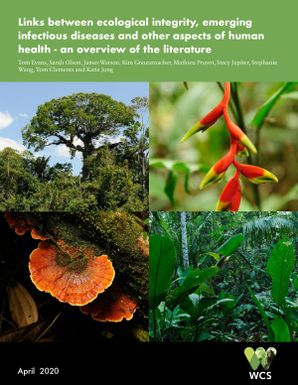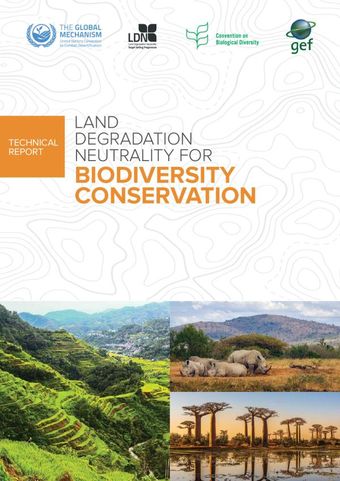Links between ecological integrity, emerging infectious disease and other aspects of human health - an overview of the literature
- Description:
- Environmental degradation has significantly altered ecological systems worldwide and continues to expand into new areas. Majority of infectious disease threars are zoonotic and often cause a major social and economic impacts. Ecological degradation by humans increases overall emerging zoonotic disease risks. The increased risk results from multiple interacting pathways including increased human contact with pathogens and disruption in pathogen ecology. Degradation of ecosystem also has complex effects, feedback loops and some notable negative impacts on many other aspects of human health, including; the prevalence of long established (endemic0 zoonotic diseases, vector-borne and water-borne diseases; air quality, nutrition, menatl health and access to traditional medicines as well as effects on human health through the impacts of climate change. In avoiding environmental degradation (by keeping ecosystems as intact as poddible and avoid creation of high risk interface zones and high risk activities that increases human wildlife contact), combined with broader One Health approaches that address the full range of risk factors, will help to reduce risk to humanity from emerging zoonoses and can have othe beneficial health outcomes as well. Hence protecting ecological integrity should be a a proority action within any comprehensive plan to avoid future zoonotic outbreaks, alongside other critical measures such as addressing the wildlife trade, building surveillance and response system providing global access to health care and mitigating disease risks associated with domestic animals.
- Display date:
- 2020
- Collections:
- Secretariat of the Pacific Regional Environment Programme (SPREP)
- Publisher:
- Secretariat of the Pacific Regional Environment Programme (SPREP)
- Content partner:
- Secretariat of the Pacific Regional Environment Programme (SPREP)
- Availability:
- Not specified
-
Copyright status: All rights reservedFind out more about what you are able to do with this itemThis item is all rights reserved, with means you'll have to get permission from Secretariat of the Pacific Regional Environment Programme (SPREP) before using it. For more information, please see our use and reuse page.What can I do with this item?Non-infringing useNZ copyright law does not prevent every use of a copyright work, and this item may be hosted by an international institute or organisation. You should consider what you can and cannot do with a copyright work.No sharingYou may not copy and/or share this item with others without further permission. This includes posting it on your blog, using it in a presentation, or any other public use.No modifyingYou are not allowed to adapt or remix this item into any other works.No commercial useYou may not use this item commercially.
Related items
Welcome and warm Pasifik greetings
The information on this site has been gathered from our content partners.
The names, terms, and labels that we present on the site may contain images or voices of deceased persons and may also reflect the bias, norms, and perspective of the period of time in which they were created. We accept that these may not be appropriate today.
If you have any concerns or questions about an item, please contact us.

